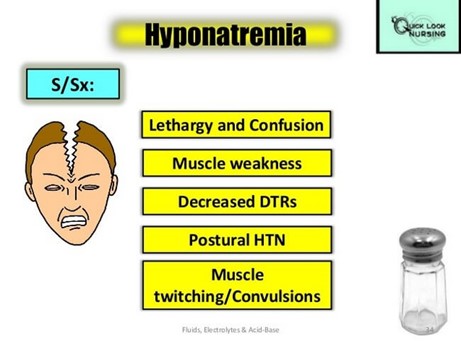A nurse is reviewing the laboratory results for a client who reports vomiting and diarrhea for 2 days.
Which of the following laboratory findings should the nurse expect?
Hypermagnesemia.
Hyponatremia.
Hypocalcemia.
D. Hyperkalemia.
The Correct Answer is B

This means low sodium levels in the blood.
Sodium is an electrolyte that helps regulate fluid balance and nerve and muscle function.
Vomiting and diarrhea can cause dehydration and loss of sodium through fluids.
Normal sodium levels are between 135 to 145 millimole/Liter.
Choice A is wrong because hypermagnesemia means high magnesium levels in the blood.
Magnesium is another electrolyte that helps with nerve and muscle function, as well as blood pressure and blood sugar regulation.
Hypermagnesemia is rare and usually caused by kidney failure or excessive use of magnesium supplements or laxatives.
Normal magnesium levels are between 1.46 to 2.68 milligram/deciliter.
Choice C is wrong because hypocalcemia means low calcium levels in the blood.
Calcium is an electrolyte that helps with bone health, muscle contraction, blood clotting and nerve signaling.
Hypocalcemia can be caused by vitamin D deficiency, kidney disease, thyroid problems or certain medications.
Normal calcium levels are between 8.8 to 10.7 milligram/deciliter.
Choice D is wrong because hyperkalemia means high potassium levels in the blood.
Potassium is an electrolyte that helps with nerve and muscle function, especially the heart.
Hyperkalemia can be caused by kidney disease, diabetes, adrenal gland disorders or certain medications.
Normal potassium levels are between 3.6 to 5.5 millimole/Liter.
Nursing Test Bank
Naxlex Comprehensive Predictor Exams
Related Questions
Correct Answer is ["C","D","E"]
Explanation
The correct answer is choice C, D, and E.
Choice A rationale:A client being unable to afford physical therapy is a financial issue, not an incident that affects patient safety or care quality. This situation should be addressed through social services or financial counseling, not an incident report.
Choice B rationale:A client being dissatisfied with meal temperature is a service quality issue, not a safety incident. This should be reported to the dietary department or patient services for resolution, not through an incident report.
Choice C rationale:A client’s visitor becoming dizzy and fainting in the client’s room is an incident that affects the safety of the visitor. An incident report should be completed to document the event, the visitor’s condition, and any actions taken to provide care or prevent future occurrences.
Choice D rationale:A client receiving burns from a heating pad is a safety incident that directly affects the client’s well-being. An incident report should be completed to document the injury, the circumstances leading to the burn, and any immediate care provided.
Choice E rationale:A client becoming disoriented and falling out of bed is a significant safety incident. An incident report should be completed to document the fall, the client’s condition, and any interventions implemented to prevent future falls.
Correct Answer is A
Explanation
This is because a frayed electrical cord can pose a serious risk of electric shock or fire to the client and the nurse.
The nurse should act quickly to eliminate the hazard and ensure the safety of the client and others.
Choice B is wrong because accessing the facility’s maintenance protocol is not the first action the nurse should take.
The nurse should prioritize removing the device from the room before following any protocol.
Choice C is wrong because reporting defective equipment is not the first action the nurse should take.
The nurse should prioritize removing the device from the room before reporting it to the appropriate authority.
Choice D is wrong because requesting a replacement device is not the first action the nurse should take.
The nurse should prioritize removing the device from the room before requesting a new one.
Whether you are a student looking to ace your exams or a practicing nurse seeking to enhance your expertise , our nursing education contents will empower you with the confidence and competence to make a difference in the lives of patients and become a respected leader in the healthcare field.
Visit Naxlex, invest in your future and unlock endless possibilities with our unparalleled nursing education contents today
Report Wrong Answer on the Current Question
Do you disagree with the answer? If yes, what is your expected answer? Explain.
Kindly be descriptive with the issue you are facing.
